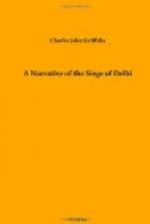Shortly after the Mooltani Horsemen rode away I saw a party of Goorkhas coming towards the gate. They were strolling along quite unconcernedly, laughing and chatting together, with their hands in their pockets and quite unarmed, not even carrying their favourite kukri. Coming to where I was standing just outside the gate, they laughingly asked me to allow them to take a stroll down the Chandni Chauk and through a part of the city for a short time. My orders were imperative, and I told them so; whereat they said they belonged to the Sirmoor battalion—the gallant regiment which, in conjunction with the 60th Rifles, had defended the right of our position throughout the siege. The corps was still stationed at their old quarters at Hindoo Rao’s house, and not one of them up to this time had entered Delhi. Naturally, they said they wished to see the city, promised most faithfully that they would refrain from looting, and return to the Lahore Gate in an hour’s time. I found I could not resist the importunities of these brave little fellows, and, trusting to their honour, at last consented, though contrary to orders, to grant them admission. We watched them walking along the Chandni Chauk, staring in wonder at all they saw, till lost in the distance. Punctual to the time mentioned the Goorkhas returned, and, thanking me for my courtesy, made their way to their old quarters on the ridge.
During my tour on duty on this occasion at the Lahore Gate upwards of 500 of the Delhi populace were turned out of the city. They extended in a long string up the Chandni Chauk, decrepit old men and women with groups of young children. It was a pitiable sight, drawing forth exclamations of sympathy even from the rough soldiers on guard.
It had been brought to the notice of the General that some of the former inhabitants of Delhi, including sepoys, were in the habit of entering the city for the purpose of carrying away valuables, being drawn up by ropes held by confederates on the walls, and that many had also escaped in the darkness by the same means. Several captures had already been made, a strict watch was ordered to be kept at the several gates, and patrolling parties to march at intervals outside the walls. The day I was on guard at the Lahore Gate Hodson rode up to me from the outside, and said he had seen some natives on the walls close by, evidently attempting to escape into the country. I immediately sent round a corporal and four soldiers in the direction indicated, who presently returned with six natives—carrying bundles—whom they had made prisoners. All men thus captured were sent to the Governor of the city at the Kotwalli, who disposed of them as he thought fit, having the power of life and death in these matters. The Governor had the repute of being over-indulgent with regard to the disposal of the captives, being considered too merciful in his treatment of men who, for aught he knew, had forfeited their lives in joining the armed rebellion against our authority.




